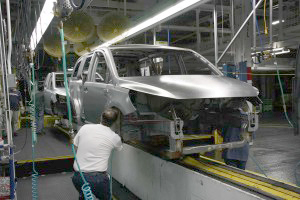After 30 years, Chrysler may wind up pulling production of its iconic minivan out of Canada, warned Sergio Marchionne, CEO of the newly merged Fiat Chrysler Automobiles.
The maker is nearing a decision on a number of key investments, Marchionne told reporters during an appearance at the Toronto Auto Show, but it has so far not been able to nail down plans for re-tooling an assembly plant in Windsor, Ontario, across the Detroit River from Detroit, since Canadian officials have dragged their feet on a financial assistance package.
“We’ve got to decide whether you want this or not,” Marchionne said, using the interview to send a message to Canadian officials. “And if you do, I’ll be more than willing to stay. I’m not using this as a threat, but there are some parts of the world that are desperately looking for capacity utilization, where infrastructure exists, is in place and is operational.”
The Windsor plant was one of two where Chrysler once built its ground-breaking minivans, launched in 1984, but as demand fell it shuttered the second facility in St. Louis. Chrysler is now redesigning its people-movers in hopes of kick-starting the declining market and will need to make a significant investment to tool up for their production.
Marchionne said he has heard from other jurisdictions, including the U.S. and Mexico, about moving minivan production. They’re likely to offer better incentives than Canada, he said.
(New study finds Dodge Grand Caravan is minivan with lowest cost of ownership. Click Here to find out what other models led the list.)
During his speech Marchionne stressed that, “We need to learn from the past and not repeat the ill-advised commercial practices that got us into trouble and which were exposed by the Great Recession.
“All of us in the car business understand that we cannot allow the return of the overcapacity problem that had become chronic before the restructuring,” he added.
(Chevrolet debuts new City van. Click Herefor a first look.)
During his conversation with reporters, Marchionne also suggested that having recovered from the recession, carmakers have the opportunity to play a leading role in the creation of a cleaner, safer planet.
“Gasoline has been the dominant form of fuel for more than a century, but on this show floor you can see the evidence that we are in a period of transition,” he said, referring to a mix of conventional vehicles, hybrids, plug-ins and battery-electric vehicles. “All of us are only too well aware that collectively we need to reduce dependence on oil. It is a goal we need to pursue with utmost effort, not just to meet tough regulatory demands but first and foremost to contribute to the world we will leave to future generations.”
There is, Marchionne added, “a huge untapped potential in alternative fuels,” natural gas, in particular, which he called “the cleanest readily available alternative in terms of emissions.”
Canada is already one of the world’s leading producers of natural gas, and recent discoveries have increased the estimates of recoverable natural gas in the country, he added.
(Click Here to see why Chrysler earnings quadrupled in the fourth quarter.)
Marchionne said carmakers have to find new ways to improve the safety and quality of vehicles. But the industry also must address a host of challenging issues involving privacy, cyber-security, affordability, consumer acceptance, and liability.
“Our leadership as an industry is defined not just by the amount of money our companies make, but by the role we can play for future generations, and by the enormous opportunities we are able to create, for our people and for the society as a whole. It is this commitment to behave ethically and to improve the quality of life in society that gives merit and dignity to what we do,” he said.


It’s the SOS with companies looking for tax payer support and then they don’t even repay their debt when the tax payers bail their butts out due to mismanagement by the company. The audacity of some CEOs is incomprehensible.